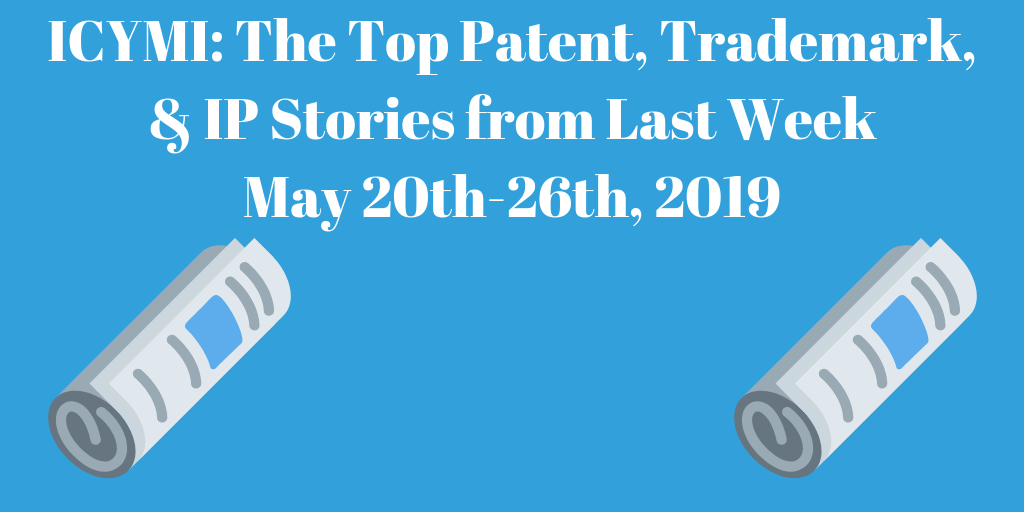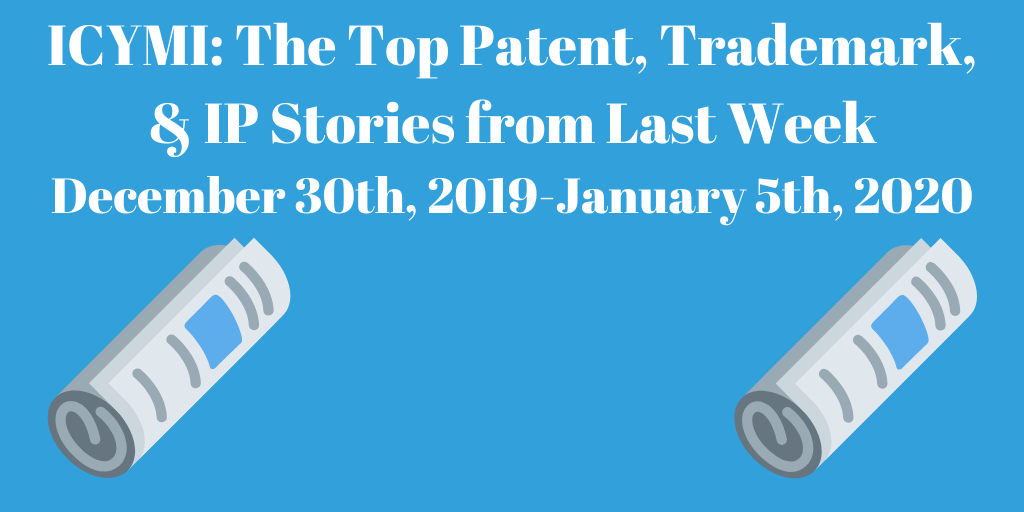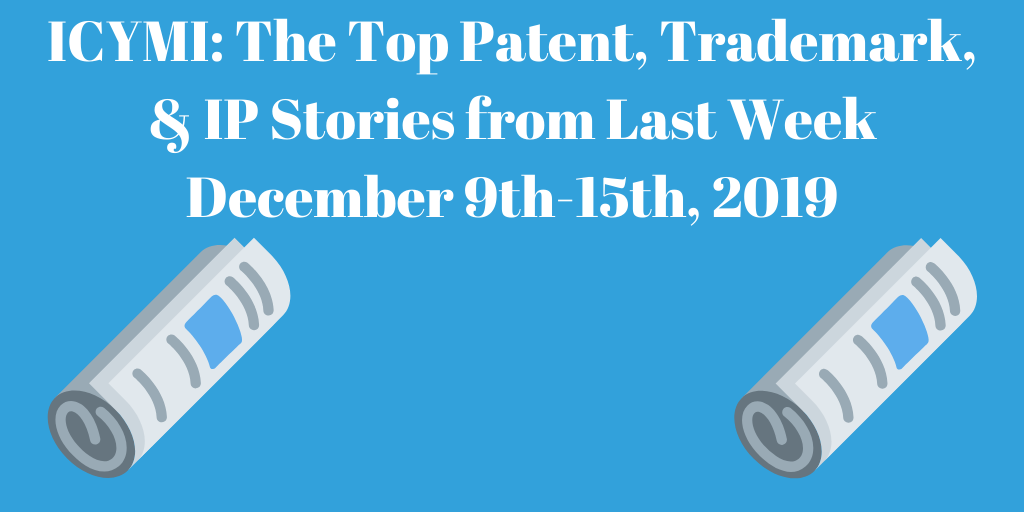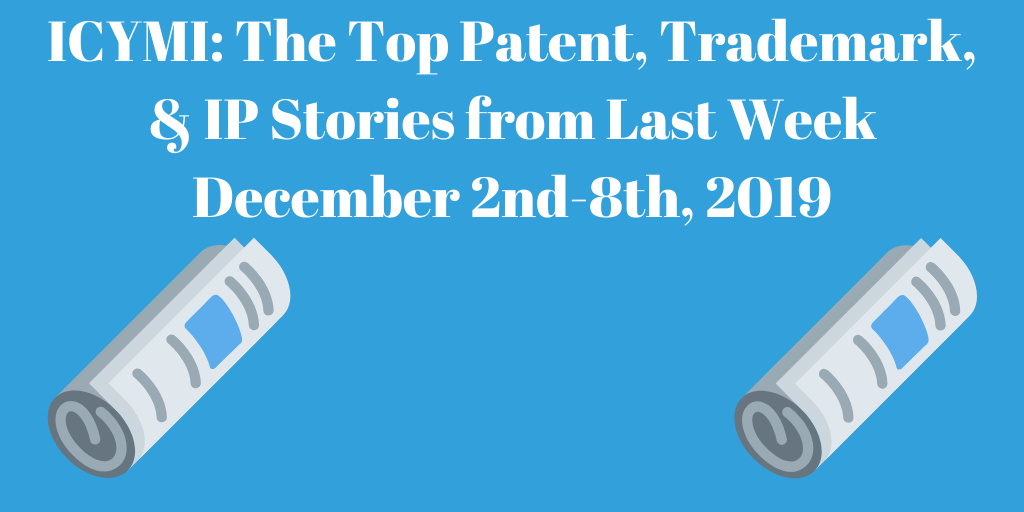Top Patent, Trademark, and IP Stories from Last Week (5/20-5/26/19)
Every week, we will be highlighting the top patent, copyright, trademark, intellectual property, etc. stories of the previous week in our “In Case You Missed It” segment. The list itself is in no particular order and includes a wide range of stories from the patent world that are informative, noteworthy, or just plain bizarre. The stories included encompass everything from Supreme Court cases to insights into growing industries. Please feel free to comment your thoughts on the stories or share an important one we missed!
“Supreme Court’s Bankruptcy, Trademark Decision and Its Effect on Franchises”
On May 20th, the Supreme Court reversed a decision in the case of Mission Product Holdings Inc. v. Tempnology, LLC with an 8-1 ruling. In 2012, Tempnology, IP holder for specialized socks, towels, and other exercise apparel, entered an agreement with Mission Product Holdings to distribute and market Tempnology’s products using their trademarks. In 2015, Tempnology filed for bankruptcy and sought to reject its agreement with Mission Product Holdings under Section 365 of the Bankruptcy Code.

In bankruptcy court it was decided Mission would have to discontinue the distribution and promotion of products using Tempnology’s trademarks. When the case was moved to the First Circuit, the decision was affirmed, the court arguing the continued use of Tempnology’s trademarks by Mission was unfair.
On May 20th, the Supreme Court reversed the decision ruling in Mission’s favor that the rejection of an agreement does not mean the trademark license is terminated. The court holds that “Section 365, a debtor’s rejection of an executory contract in bankruptcy has the same effect as a breach outside bankruptcy. Such an act cannot rescind rights that the contract previously granted. Here, that construction of Section 365 means that the debtor-licensor’s rejection cannot revoke the trademark license.”
Attorney Craig Tractenberg examines the 2009 Chrysler Chapter 11 reorganization whereby Chrysler terminated the dealership agreements of 789 of its dealers. This forced these dealers to discontinue the sale of Chrysler, Dodge, and Jeep vehicles. Tractenberg argues the case would have come out differently with the new ruling in place. Dealers would presumably retain their rights to continue selling the aforementioned vehicles. Regardless, the ruling will undoubtedly cause licensors to better plan ahead of potential bankruptcy. To read more about this story, click here (via The Legal Intelligencer, May 24th, 2019).
“Affordable Prescriptions for Patients Act Would Allow FTC to Prosecute Pharma Patent Thickets, Product Hopping”
A few weeks back we touched on the Affordable Prescriptions for Patients Act of 2019. Introduced to the Senate floor on May 9th, the bill would amend the Federal Trade Commission Act to “prohibit anticompetitive behaviors by drug product manufacturers, and for other purposes.” Essentially, the bill aims to make it harder for drug companies to use “patent thickets,” overlapping patents designed to protect all conceivable parts of a drug. Such a measure would make it easier for generic prescriptions to enter the marketplace.
Sen. Corbyn who introduced the bill stated drug companies have “taken advantage of the patent system to maintain their monopoly on certain drugs and prevent generics from coming to market.” Corbyn argued the bill will “encourage the availability of cheaper generics” for the American people.
The bill would allow drug companies accused of anticompetitive patent thicketing by the Federal Trade Commission to make rebuttals by providing evidence that additional patents result in:
- clinically meaningful and significant therapeutic or safety benefit
- significantly improved product purity or potency
- significant gained efficiencies in manufacturing; or
- other improved product attributes having substantial benefits for consumers or patients;
- a generic drug or biosimilar biological product could be marketed commercially without incorporating the improvements claimed in the additional patents described in item (aa); or
- for each of the later filed patents, the manufacturer had substantial financial reason, apart from the financial effects of reduced competition, to file each of the patents;
Such a proposition would completely overhaul the current patenting practices of the pharmaceutical industry who sometimes place 100 patents on one drug. Something to keep an eye on as the bill moves forward through Congress. To read more about this story, click here (via IPWatchdog, May 20th, 2019).
“Tesla Patent Application Would Make Vehicle Neural Networks Safer”
A new patent from Tesla seeks to reduce the risks that come with new cars integrating more computer technology and self-driving operation. The technology will recognize errors in vehicle neural networks without having to prevent the execution of that neural network when error is detected. Tesla claims it is important to have safeguards in place to ensure such computer-enabled features of the vehicle do not “increase the risk of operating the vehicle.”
First, a neural network processor will execute a neural network when required to. From there, an error detector will detect the error and submit it to a neural network controller. The neural network controller will then signal the neural network as corrupt without having to suspend the execution of the neural network. This will allow the neural network to proceed.

During operation, Tesla indicates engines may experience a wide range of errors including “invalid operations, division by zero, overflow, underflow, denormalization, inexact numbers, and/or the like.” In order to correct these, the car may need to immediately pause and/or terminate the neural network without “resetting the neural network processor.” During this time, instructions may be “reloaded and/or otherwise corrected” in order for the neural network to continue functioning
The patent illustrates neural network processors as any “non-transient, tangible, machine readable media that include executable code” including CD-ROMs, RAM, EPROM, or even floppy disks. To read more about this story, click here (via Forbes, May 23rd, 2019).
“Facebook Reveals More Details on AR Glasses in New Patent”
A new patent from Facebook reveals more details about its anticipated augmented reality (AR) glasses. The patent outlines a “cartilage conduction audio system for eyewear devices” which would be located behind and inside the ear. Sound would be projected into the ear while allowing users to “receive spatial cues from ambient sound” around them. This would be done by a transducer assembly vibrating the auricle, creating acoustic pressure waves, and then using the waves to update vibration instructions. Such an ability to hear ambient noises is imperative to the immersion experience, Facebook argues.

Additionally, Facebook contends the audio system would be safer and more comfortable than current AR headsets, allowing users to wear them for extended periods of time. With the technology still years away from development, do not expect to see them on store shelves anytime soon. To read more about this story, click here (via Mashable, May 23rd, 2019)




